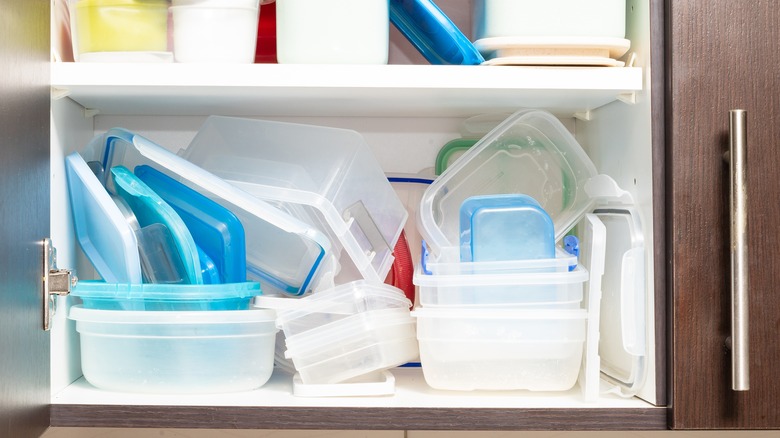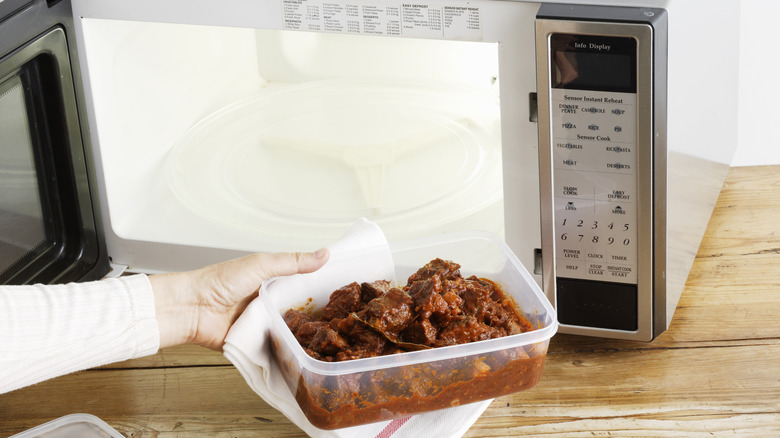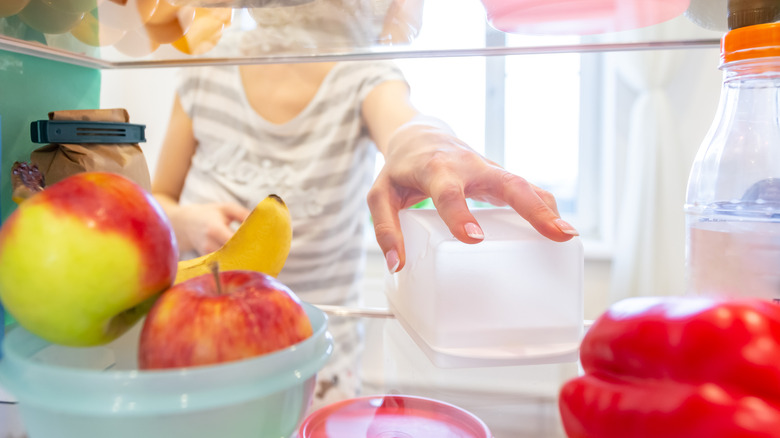When To Throw Away Your Plastic Storage Containers & Declutter Your Cabinets
We may receive a commission on purchases made from links.
Love them or hate them, you probably have a pile of plastic food storage containers stashed somewhere in your kitchen. These containers are endlessly useful for storing leftovers or holding your freshly washed produce until you're ready to cook it; but plastic bins can also perpetuate the endless cycle of clutter in your kitchen, not to mention that they come with a very real shelf life. But how do you know when yours have officially bitten the dust and need to be retired?
Plastic food containers, like the brand names Tupperware or Ziploc, are often cited to last between five and 10 years, which makes them a fairly decent investment for their low upfront cost. Even though you may be tempted to continue using your plastic food containers for longer, there can be negative side effects that should give you pause. Beyond the general age of the container, there are other factors that can lead to their eventual demise. These include how heavily they've been used, if they are showing signs of wear and tear, or if the containers have difficult-to-remove food stains. With the right knowledge, you can determine if your plastic storage containers are in the best condition for use or need to go, as well as proceed with decluttering your cooking space.
Why using older plastic containers can be dangerous
If you cannot remember how old a plastic storage container is or where you got it from, it's almost certainly in your best interest to get rid of it. In addition to the general deterioration that plastic suffers after being used, washed in the dishwasher, or plastic containers that you should stop heating up in the microwave regularly, older containers manufactured by Tupperware and its competitors may have been crafted with Bisphenol A (BPA). Linked to numerous health concerns, this chemical has been retired from use in many plastic storage containers since 2010.
Beyond the risk of BPA, your grandmother's vintage plastic food storage containers may even harbor lead, mercury, or other toxic compounds. Older plastic food storage containers stand the risk of breaking down over time, making them less safe to use than they were at the time of purchase. The bottom line? Avoid trying to stretch the life of your plastic containers. If you've used a resealable container heavily for a number of years, it might be best to retire it. And if you're queasy about throwing away seemingly perfectly good bins, you can always recycle them or reuse them to store non-food items like LEGOs or Play-Doh.
Telltale signs it's time to declutter and how to do it
The age of a plastic bin can sometimes be deceiving: you may have a six-year-old container that you have hardly used, whereas your favorite resealable salad bowl from two years ago has been deployed every day when you take it to work. Other signs that you should get rid of your Tupperware include visible wear, such as scratch marks or stains from former meals you've stored in it (this includes plastic takeout containers that are generally meant for single-use but often get brought into regular rotation). The presence of lingering odors is another red flag, and one that could signal the existence of bacteria. Additionally, plastic containers that have become mangled or deformed in the dishwasher or microwave, should be thrown in the recycling bin immediately.
To further declutter your Tupperware, recycle pieces that have lost their lids, and ascertain which containers you actually use. Does that extra large container fit comfortably in the dishwasher or fridge? What about that never-used Tupperware you keep holding onto for the ever-elusive "one day?" Is it worth keeping containers that aren't freezer-safe? Containers that don't make the cut can be recycled or repurposed for non-food items. Finally, food bins you choose to keep in use can be stored efficiently with solutions like turntables (these ones on Amazon cost $20), risers (The Container Store sells acrylic ones in various sizes), or some easy DIY sliding shelves.


